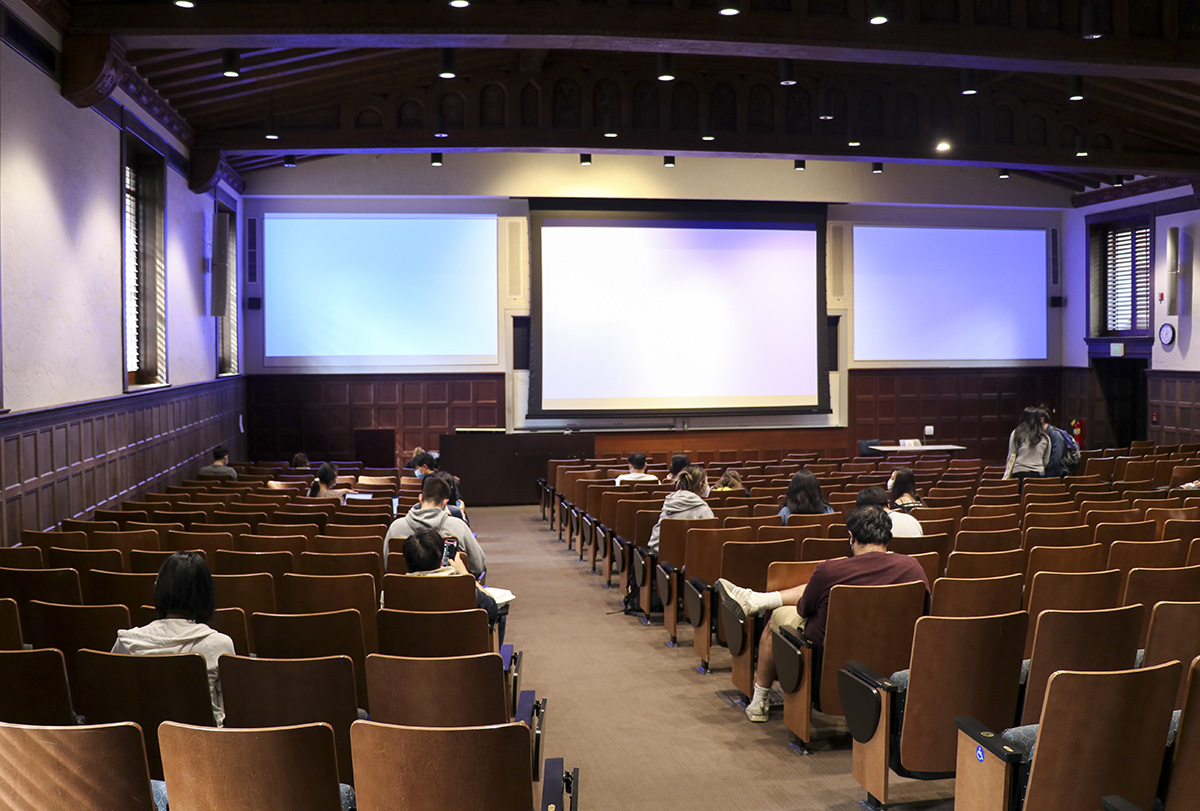UCLA students continue to express concerns regarding hybrid options

UCLA defaulted to in-person instruction for classes Feb. 14, although some classes were provided departmental exceptions to be held in a hybrid format. (Victoria Li/Daily Bruin senior staff)
By Mia Rossi
Feb. 27, 2022 11:57 p.m.
Students expressed continued concerns regarding the lack of hybrid options offered with classes defaulting to in-person operation after Feb 14.
The COVID-19 Response and Recovery Task Force announced Jan. 21 that the university would return to in-person instruction beginning Jan. 31. Instructors were given the option to offer classes remotely for up to two weeks following the transition to in-person instruction. Departments seeking exemptions to the in-person requirement were required to submit a request by Jan. 26.
UCLA spokesperson Bill Kisliuk said in an emailed statement the decision to return to in-person instruction was based on the administration and Academic Senate’s evaluation of public health information and their belief that in-person instruction does not pose a significant risk to the UCLA community.
Despite calls from student leaders to allow hybrid options, instructors are not currently required to offer hybrid instruction.
[Related: Student leaders suspend sit-in, reach agreement with UCLA administrators]
Kisliuk said not every class should be held with hybrid options because some instructors may find it difficult to divide their attention between in-person and remote modes. However, he also said that students missing class because of illness must be given options to make up their attendance credit.
“In-person teaching and learning have long been critical components of UCLA’s excellence and make an enormous difference for students whose campus experience has been severely limited by the pandemic,” he said.
Angelina Quint, the Academic Affairs commissioner of the Undergraduate Students Association Council, said that the Undergraduate Council of the Academic Senate is reluctant to mandate hybrid options because of a few reasons, including academic freedom and the right of faculty to set their own educational standards. Academic Senate members also said that the process of transitioning courses to a hybrid format is inconvenient and that classes taught remotely are of lower quality, added Quint.
Quint also said that she has been advocating for remote options for students since the start of her term in May 2021 and that her commission has been informing professors of students’ complaints and suggesting ways they can make their classes more accessible.
The Academic Affairs Commission is also working with the UCLA Center for the Advancement of Teaching and the UCLA Title IX Office on spreading awareness of the importance of hybrid learning options and policy changes to accommodate students who are parents.
Camila Krause, a second-year molecular, cell and developmental biology student and a member of the Disabled Student Union, said that immunocompromised and disabled students, who are eligible for remote accommodations through the Center for Accessible Education, are not the only groups deserving of remote accommodations. Other students, such as those who have small children or commute to campus, may also need remote options, Krause said.
Although not required by the university, a number of instructors have opted for hybrid teaching to accommodate students’ needs.
Rick Dale, a communication professor, chose to offer his two classes in a hybrid format by holding lectures in person and also recording them for students who are unable to attend class in person.
“I think what the situation has brought in the past two years is just really increased variance and experience in a lot of ways: you know, people dealing with tragedies and difficulties and so on, and others for whom the critical ingredient is getting back together,” Dale said.
Dale said that although hybrid is not the easier option for him to implement, he prefers it because it makes his course more accessible and accommodating for students.
Krause said that as an immunocompromised student, attending in-person classes poses a risk to her health. She also said there are days when her pain levels are especially high and instances when she may have to take emergency doses of medications that make her drowsy, adding that in these situations getting out of bed to attend class is particularly difficult.
Ahmed Shurbaji, a third-year psychobiology transfer student, said that requiring students to attend in-person classes may compel them to make potentially unsafe decisions.
“With required attendance, it’s very dangerous because people who might have symptoms may overlook them,” he said. “It forces students to make unsafe decisions as a result of the culture of prioritizing grades over physical health.”


